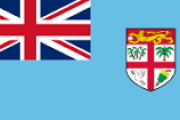AMBASSADOR PRASAD CALLS FOR A COHESIVE RESPONSE TO THE PEACE AND SECURITY CONSEQUENCES OF THE CLIMATE CRISIS AT THE UN SECURITY COUNCIL
Fiji’s Ambassador and Permanent Representative to the United Nations Dr Satyendra Prasad has called on the Permanent Members of the United Nations Security Council (UNSC) to pursue a cohesive global response to address threats to international peace and security arising from the climate crisis.
This was conveyed at the UN Security Council’s Open Debate on “Peace and Security implications of the Climate Crisis” convened last week by the United Kingdom Prime Minister, Rt Hon. Boris Johnson in his role as the President of the UNSC.
Speaking at this special meeting of UNSC, the UN Secretary General Guterres shared a timely reminder that “while we tackle COVID-19, we cannot postpone Climate Action. The climate crisis is not on hold. There is no magical pause button on the climate crisis”.
In his role as the President of the UN Security Council for February, UK’s Prime Minister Boris Johnson said “UK is absolutely committed to tackling threats to international security. Climate change is a threat to our collective security and the security of our nations”. Prime Minister Johnson challenged states, reinstating “whether you like it or not, it is not a matter of when, not if, your country and your people will have to deal with the security impacts of climate change?.”
The United States Special Presidential Envoy on Climate, Secretary John Kerry similarly called on the UNSC to “start treating the climate crisis like the urgent security threat that it is”. The Presidential Envoy said that “we bury our heads in the sand at our own peril”.
In his statement to UNSC, Ambassador Satyendra Prasad said that impacts and consequences of climate crisis on Small Island Development States across the Blue Pacific are growing.
Ambassador Prasad said that the “three cyclones in Fiji over the past year have shown that there was no pause to the climate crisis when Fiji was confronting the COVID-19 Pandemic”.
“As I address you today, the Fijian Government through its disaster response agencies; its Navy and Military, its civil society are working with the United Nations to rebuild homes, rebuild livelihoods and restore services to communities across Fiji that are recovering from Tropical Cyclone Ana that struck Fiji two weeks ago.
“But at the very same time, they are also responding to support communities and families recover from the Super Cyclone Yasa that struck Fiji only a month earlier and responding to two major cyclones at the same time. While the Fijian Government is working with its development partners to recover from these two cyclones Ana and Yasa; it is at that very same time working to restore livelihoods of communities that were impacted by Super-Cyclone Harold that struck Fiji earlier last year. Responding to three major cyclones at the same time surely cannot be normal”.
Ambassador Prasad said Pacific economies are being threatened by the growing climate pressures on their blue economy and that the relocation of coastal communities presents that most startling of all challenges.
“The growing insecurity arising from the relentless assault of the climate crisis – from its catastrophic impacts; to its slow onset impacts such as longer periods of droughts and worrisome rise of food insecurity across islands states; sustained sea level rise and its consequences for relocation of whole communities demands the attention of the UN Security Council in a wholly new way.”
“Fiji has called on UN Secretary-General to provide detailed reporting on security implications of the climate crisis with a clearer focus on small island states”.
Ambassador Prasad has called for “far better alignment of political, peace building and development interventions in climate stressed settings and a “far more unified UN response to mainstreaming peace and security perspectives in all development investments in climate vulnerable countries”.
Reflecting on Fiji’s 40 years of contributions to the UN Peacekeeping, Ambassador Prasad said, “It has brought into UN peace operations, years of accumulated expertise and deep insights into how climate crisis fuels instability; and operational understanding of how to identify and manage tensions arising from the climate crisis. These are crucial skills and expertise that Fiji brings into the UN peace operations”.
In a special briefing to this UN Security Council, renowned British naturalist and broadcaster Sir David Attenborough pleaded with the UNSC that the “security of the entire world depends on the decisions of the Security Council - you hold the key to preventing a global catastrophe. Security threats arising from climate change requires unparalleled levels of global cooperation.”


